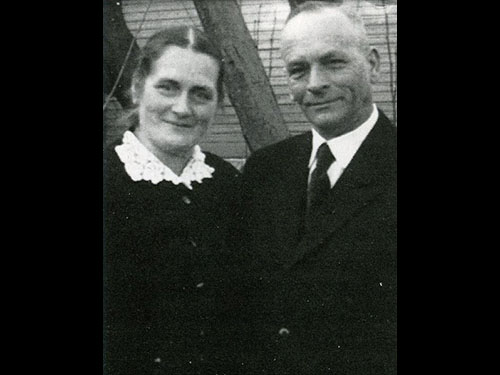Neighborly Help: Benjamin and Luise Schwarz
Since food was rationed, feeding and additional two adults, living illegally, was not easy in the final years of the war without food ration cards. Salvation came from tacit neighborly help from farmers who illicitly delivered some of the food they had produced themselves. A schoolmate of the Goes’s daughter Brigitte, born in 1936, Elisabeth Faber recounted in a lecture in 1995:
How was the married Krakauer couple supplied with food, though? That functioned thusly: Pastor Mörike asked Mr. Immendörfer in Heimerdingen, who had also already taken the family in for a time, whether he knew of any one of the farmers in Gebersheim who was reliable and would help provide for the Jewish family. My two uncles, Gottlob and Benjamin Schwarz, both from the Hahn Community, who were big farmers, were let in on this. My cousin Martha and I were sent to the parsonage with a basket and a milk can nearly daily. In the basket were bread, butter and other food. There was special meat soup on slaughtering day. Mrs. Goes took care of her guests until another hideout was found again for a time. Today, Mrs. Goes considers it to have been God’s protection that nothing happened in those days to either the refugees or the family. (From a lecture by Elisabeth Faber, Gebersheim, about Elisabeth Goes at the District Women’s Day on February 18, 1995 at the Haus der Begegnung, Leonberg)
Source / title
- © Private propetrty of Liselotte Schwarz; Reprint: Krakauer, Lichter, 126 © Calwer Verlag, Stuttgart

